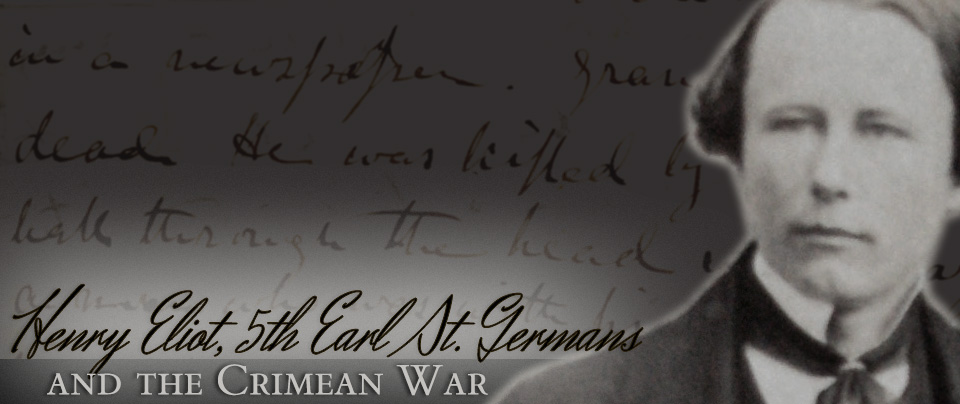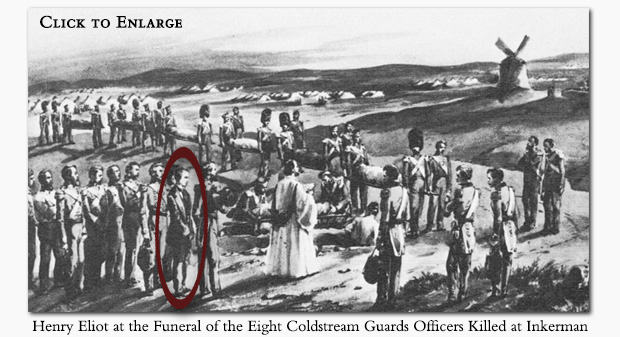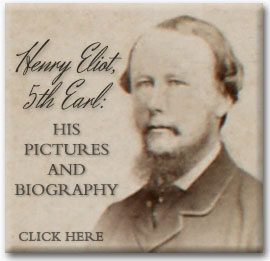Henry Cornwallis Eliot & the Crimean War (Transcriptions)
These transcriptions are arranged in chronological order. To see a full biography and portraits of Henry, 5th Earl of St. Germans, just click on the button in the right-hand column.
Henry Eliot in the Crimea (1854)
— "Downpatrick Recorder" 25 Nov 1854, page 1:
The Hon. Henry Eliot, R.N., fifth son of his Excellendcy the Lord Lieutenant, is serving as a volunteer with the British forces in the Crimea.
— From the Letters of Henry and Grey Neville:
Varna, June 16th (written by Henry Neville)
I saw Henry Eliot yesterday; he came up in the 'Andes' with the Coldstream. His old ship, the 'Bellerophon,' is in harbour here.
Camp at Devna, June 25th (written by Grey Neville)
I saw Henry Eliot yesterday, en route from Shumla to Varna; he thought Silistria would not hold out, but this morning a Turkish orderly brought word that they had retreated towards Kustendji, and in fact evacuated Silistria. It seems absurd, that although only about thirty miles from the enemy, our most certain information respecting it comes from England.
Galata, August 23rd, 24th (written by Henry Neville)
I saw Henry Eliot yesterday; he is living on board his old ship, the 'Bellerophon,' and intends to go with them when the expedition starts; he is in great luck to have seen all this campaign, such as it is, first with the army and then with the fleet.
Camp, Adrianople Road, August 23rd (written by Grey Neville)
Henry Eliot was here the other day; he is living on board the 'Bellerophon,' and intends going up with them if there is any fighting.
— "Seventy-One Years of a Guardsman's Life" by General Sir George Wentworth Alexander Higginson, 1916, page 19-20:
Then there were the three brothers Eliot, sons of the third Earl of St. Germans, the eldest of whom became an officer in the Life Guards, and died when a young man. The second, Granville, was one of my intimate friends; we both joined the Guards about the same time, he entering the Coldstream, I the Grenadiers. Our friendship, alas! was brought to an untimely close by his death at the Battle of Inkerman. I still remember, as if it happened but yesterday, during one of our rapid movements backwards and forwards during that eventful battle, finding his young brother, who had come up from the Fleet the night before to pay him a visit, standing over the dead body of poor Granville, paralyzed with grief and indifferent to danger. It was upon this lad that the earldom and estates of St. Germans devolved on the death of his elder brother, the fourth earl.
. . . [from pages 202-3]: To resume – Though the position we now held on the crest of the ridge was one of camparative safety, it was exposed to artillery fire, and we were losing men. We therefore moved further to our left, and, while thus changing our ground I came upon the dead body of Granville Eliot, over which stood his young brother (who, I believe, had come up from the Fleet the night before on a visit), apparently paralysed with grief and indifferent to the danger of his position, exposed as it was to shot and shell. I tried in vain to induce him to move; no entreaty prevailed; that he escaped unwounded was little short of a miracle.
— "Seventy-One Years of a Guardsman's Life" by General Sir George Wentworth Alexander Higginson, 1916, page 19-20:
Then there were the three brothers Eliot, sons of the third Earl of St. Germans, the eldest of whom became an officer in the Life Guards, and died when a young man. The second, Granville, was one of my intimate firends; we both joined the Guards about the same time, he entering the Coldstream, I the Grenadiers. Our friendship, alas! was brought to an untimely close by his death at the Battle of Inkerman. I still remember, as if it happened but yesterday, during one of our rapid movements backwards and forwards during that eventful battle, finding his young brother, who had come up from the Fleet the night before to pay him a visit, standing over the dead body of poor Granville, paralyzed with grief and indifferent to danger. It was upon this lad that the earldom and estates of St. Germans devolved on the death of his elder brother, the fourth earl.
— Undated document by Sir Arthur Cowell Stepney (brother of Lt.-Col. Murray Cowell, one of the Coldstream Officers who was killed at the Battle of Inkerman):
There is also a colored print in my sitting room here, of the burial of the eight Officers on the 6th of November '54. The figure of the young Naval Officer near the clergyman, is meant for Henry Eliot, who came to attend his brother Granville's funeral.
* The above black-and-white copy of the above mentioned painting of the Coldstream Guards' funeral after Inkerman was published in "The Story of the Guards" by Sir Julian Paget. I'm very interested in learning anything about this painting, so if anyone reading this can offer more information about it (or can help locate a photo of a colour version), please contact me.
— "Rough Recollections of Military Service and Society, Volume 1" by Balcarres Dalrymple Wardlaw Ramsay, 1882, page 8-9:
My particular friends [at Cheam] were the two Eliots, the late Lord Eliot and Granville Eliot — the former one of the handsomest young fellows I ever saw. The latter became a gallant Guardsman, and was killed in the Crimean war. Years after, when staying at St Germans, Lord St Germans [Henry, 5th Earl] showed me his uniform, medals, &c., carefully preserved in a cabinet, and listened with deep interest to all I could tell him of our school-days.



